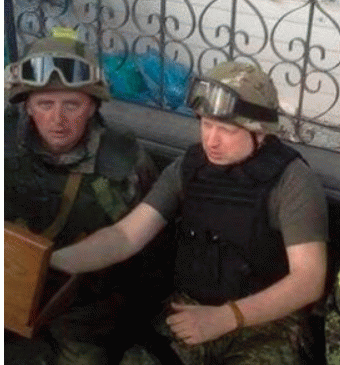From the start of the events that led to the coup in Ukraine, the role of Poland has been neglected for one very good reason: it has been murky, the result of a long history during which Poland alternately played a pivotal role in the northeast corner of Europe, and found itself dismembered for doing so. Having spent a year in that country in the mid-sixties, I can attest to the fact that history is never far from the consciousness of the average Pole, and this crucial factor totally escapes the Western political class - as well as its chatterers. What follows is an adaptation of an article that appeared in voltaire.net: ile:///Users/deen/Documents/Sikorski and Dziewulski: The Strategy and Tactics of the Neo-Commonwealth, by Andrew Korybko.webarchive. The author, Andrew Korbyko, is a graduate student at the Moscow State University for International Affairs. He is also the author of "Poland as the 'Slavic Turkey' of NATO Destabilization", on the same website.
"As the war in the southeast of Ukraine rages on, there is increasing proof of Poland's involvement. Though indirect (i.e. no official Polish military units on the ground), it is no less lethal. Not only was Poland complicit in training urban terrorists in the run-up to the EuroMaidan chaos, it has also sent mercenaries to put down the anti-coup protesters in the east, and now there is photographic proof.
Jerzy Dziewulski, security advisor to former Polish President Aleksander Kwasniewski, was photographed last week with former interim Ukrainian president Oleksander Turchynov in Slavyansk. Dziewulski was trained in counter-terrorism in the US, Israel, France, and Germany, and currently runs his own private security company. Despite former interim president Sikorski playing dumb about the presence of Polish mercenaries in Ukraine, promising to "report the fact to the country's prosecution office", the photo of Dziewulski and Turchynov is proof that it is the politician who is lying.

Photo taken on the outskirts of Slavyansk, at the HQ of Ukrainian â??antiterrorist operationâ? command. Jerzy Dziewulski (left) and Alexander Turchinov
(Image by Voltaire.net) Details DMCA
Photo taken on the outskirts of Slavyansk, at the HQ of Ukrainian "antiterrorist operation" command. Jerzy Dziewulski (left) and Alexander Turchinov (center).
Reports of mercenaries operating in Ukraine began on in April. When Russia's Deputy Foreign Minister reported in late-May that foreign mercenaries, "particularly from Poland", were active on the ground in Ukraine, Sikorski denied it, and now he has dismissed reports of their capture, while the Polish Foreign Ministry says the reports are insulting and in bad faith. Sikorski recently claimed that mercenaries are illegal, but when the photo of Turchynov with Dziewulski in full combat fatigues, helmet and chest holster hit the internet, he could no longer deny Poland's participation in the conflict next door.
Jerzy Dziewulski
According to his website, Dziewulski, who founded Poland's Commission for Special Services (special forces), is licensed in mine warfare, pyrotechnics, and as a sniper. He advertises himself as an expert in the organization of private companies, i.e., mercenaries, and the "customization of security plans". Considering that he was the security advisor when Kwasniewskly was the Polish President (1995-1997), it is no surprise that he should be directing Poland's legions of mercenaries against the people of the Donbass.
Sikorski is maneuvering for the EU's top foreign policy spot, replacing Lady Catherine Ashton, and has almost completely overshadowed Poland's current Prime Minister, Donald Tusk, whom 69% of Europeans can't even name. However his policy is all about advancing Poland's interests in the former Polish-Lithuanian Commonwealth, beginning with Poland's participation in the February coup. Then again, this story is not just about a coup: As an eager American servant, Poland plays an on-going role vis a vis Ukraine similar to that played by Turkey via a vis Syrian terrorists, serving as conduit for arms, personnel, and materiel."
When following events in Ukraine, keep a watchful eye on Poland, which from the start of its integration into the European Union, has marched to the tune of its own piper.





